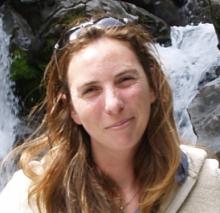"A good English paper is ultimately one that presents an interesting story"

Can you describe your career in short? What did you major in? How did you decide to become a professional editor?
I studied Zoology at Bristol University in the UK (1993–1996). During this time, I participated in sea turtle research in Greece, in addition to wildlife rehabilitation work in Greece and the UK. Following the completion of my studies, I continued conservation and consultancy work, primarily in the field of marine and coastal ecology (1996–to date). I developed my own PhD research (2006–2010), and was supervised by university professors in Greece (Aristotle University of Thessaloniki and the University of Ioannina) and the UK (Swansea University), obtaining funding from a wide range of internationally available sources. During this time, I developed skills in writing papers targeted towards mid to high-level journals, which, in turn, led to my regular participation in the peer review system. In parallel, I began editing manuscripts, reports, and funding proposals (2006–to date) for non-native English speaking colleagues from across Europe, and found I really enjoyed assisting others in perfecting their work for publication. As a result, on completion of my PhD, I applied to Editage, Cactus Communications to become a professional editor, and have continued ever since.
Which aspect of editing do you enjoy the most?
I enjoy making sense of the text, amending it into a work that clearly shows the development of the study objective and potential application of the findings, thus acknowledging the effort put into its realization.
Is there anything specific you do to provide high-quality edits across various manuscripts?
I first check that the English grammar is correct and that the continuity or development in the argument of the author is clearly presented. In addition, I also check that a nonprofessional could read the manuscript to a certain level of understanding. Finally, I look out for aspects of the manuscript that may be targeted by the reviewers, such as methodological inaccuracies or omissions, certain techniques that may need validation, etc. Furthermore, I look for ways to ensure that a manuscript is applicable to a broad scientific audience, this is particularly important when targeting mid to high impact journals, as they target researchers across many disciplines. 
As an editor, how do you define a good English paper? Do you have any advice for authors on how to improve their writing skills?
A good English paper is ultimately one that presents an interesting story that is understandable by professionals and non-professionals alike. First, it is extremely important not to present too much information within a single manuscript. Second, you need to select the core message of your data that you wish to present, and make it a major theme. In the Introduction, the argument generally starts on broader concepts and then funnels down to your study subject, and vice versa on the Discussion. Within this framework, each sentence should be short with a clear focus; each sentence should connect to the preceding and following sentence showing the development of your argument, with each paragraph encompassing a particular aspect of your study. To accomplish this objective, good English grammar, punctuation, and sentence structuring are required.
What advice would you give to junior editors on how to sustain their interest in editing and provide the client with high-quality work?
It is important to be aware that science is constantly developing. Hence, it is extremely important to read widely. I try to set aside a few hours every week to read the most recent Ecology, Behavioral and Conservation journals, to constantly improve my knowledge base, and apply it to the manuscripts I read. In addition, reading these high impact journals helps maintain a certain level of English language and style. It is important to always take into account criticism from your superiors as well as clients so that you can again continue to develop your skills.
A few words for our clients…
Through my own experience, I know the time and effort required to design, implement, analyze, and write-up research studies, and understand the importance of being able to present the findings and potential applications clearly to as wide an audience as possible. I therefore treat all the documents I receive with respect, and aim to help the authors as much as possible. My main objective is to understand the submitted document and then do a professional job in editing it to ensure that the main features are clearly presented. In addition, I always ensure that the formatting rules of the specified journal are followed where appropriate.
Published on: Dec 19, 2013
Comments
You're looking to give wings to your academic career and publication journey. We like that!
Why don't we give you complete access! Create a free account and get unlimited access to all resources & a vibrant researcher community.







